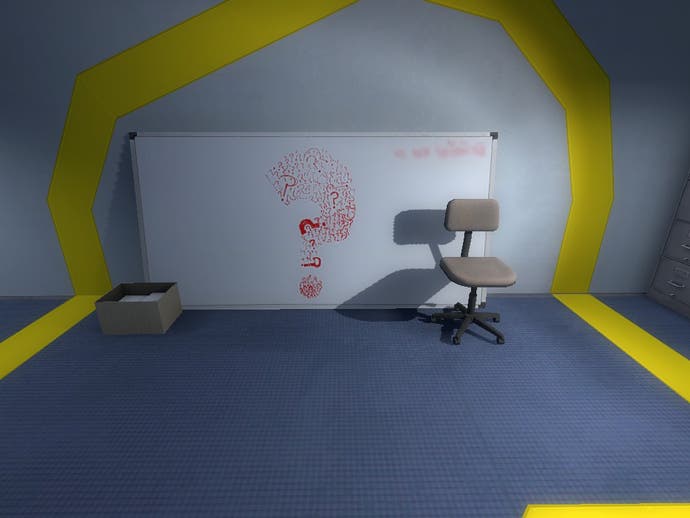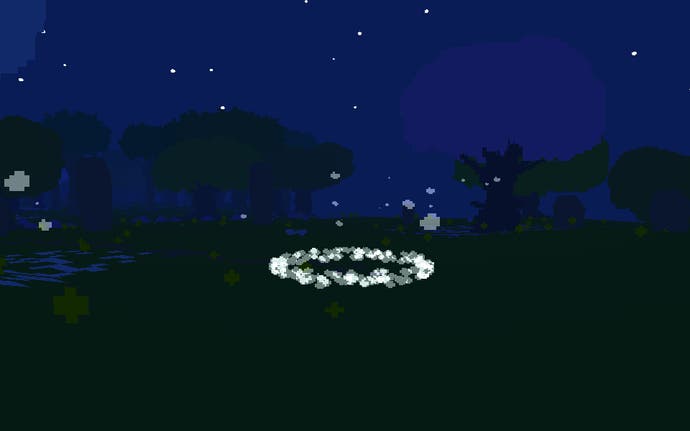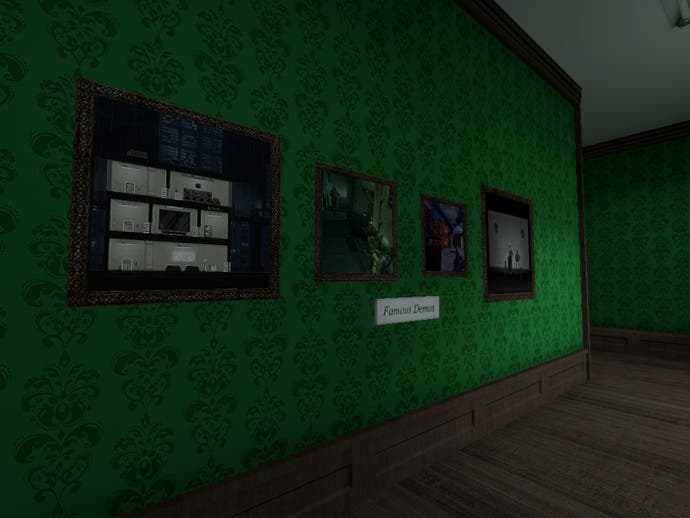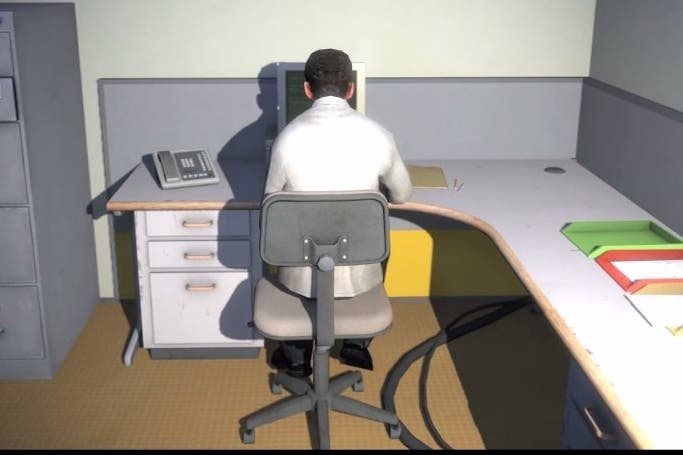Games of 2013: The Stanley Parable
Break on through.
BEGIN THE ARTICLE
Dearest Stanley, today you got to your desk and found that all your fellow writers weren't there. The editor's desk just has one of those silly weighted bird toys tapping at a glass over and over, and the deputy editor's desk is just an abandoned scribbling of nob jokes (you, dear Stanley, added some extras to it yesterday), but now there's a listless sense of unease drifting over you and a half-eaten Tunnock's Teacake. And to add to all this you have this kind of Scottishy, sort of Karen Gillan narrator annoyingly narrating everything.
Stop reading. Stop it. Go straight to the comments and type about how this article doesn't even say anything about The Stanley Parable.
Oh. You're still here.
Well there are two doors you could go through. Door number one or door number two. Gosh, how wonderful choice is, isn't it? You should scroll to door number one, because it's in your own best interest. Actually there's a third door. Don't go to door number three, because that's where the editor stores his pencils. And door number two is just Not Right.
Door number two
Oh so that's how it is, is it? Well so long as you're here maybe you can have a look at the innards of this article: it has taken me a full week to decide to get the guts to write it like this, and it went through several iterations, beginning with me writing the following:
2013 was the worst of times, it was the best of times. It was a bad year for new IPs in the big budget lines. But this year brought us Kentucky Route Zero, Redshirt, Gone Home and Papers, Please, and then Davey Wreden and William Pugh decided to bring us a fully fledged remastering of the wonderfully cerebral Source mod The Stanley Parable on Steam.
A humorous game about the illusion of game choice and the tyranny of game designers, your every move is narrated, remarked upon, mocked, by someone whose deep, mischievous voice reminds me of the BBC TV show Look Around You. This first-person exploratory game made us think about what we really mean when we say we want to choose our own path in games.

NOW GO TO DOOR NUMBER ONE.
Door number three
Even though you can't jump or interact with much, you have impaled yourself on one of the editor's pencils somehow. It has pierced you through the aorta and you are dead. I warned you not to take matters into your own hands. I just tried to help you with your choices, you know? I tried.
Door number one
You go through door number one with the graceful obedience of the game player who knows that they have to go through all the doors to get all the outcomes and to get the special achievements. Like Christian Donlan insinuated in Eurogamer's Stanley Parable review, endings in this game are like Pokemon, you want to collect them all, you have to restart and go through the process of obeying or disobeying and participating in a planned destiny until you're satisfied you've got them all, or enough.
It plays upon your curiosity: exactly how far down the rabbit hole does it go? How long can you carry on running? How far will you get obeying? Is there a 'best' outcome? These are all anxieties you feel when you play games, Stanley. I know you fear your own banality. I know you felt good about yourself when that Steam achievement popped up and said, 'Beat the game' when you'd obeyed all the way through. But… it wasn't enough for you, was it Stanley? You still wanted more choices. But those choices aren't infinite, Stanley. We intended for you to go there. They are trodden paths, Stanley. We've all been there before. You are doing our bidding. You are not unique. You are just a clone.
Go through the door that says HORRIBLE MECHANISTIC VIEW OF HUMAN BEINGS.
Door labelled HORRIBLE MECHANISTIC VIEW OF HUMAN BEINGS
Stanley. You will come to admire, even be comforted by, the dystopic architecture of games we are displaying to you. Colin Powell from 3.40 to 4.50 in this video talks about a drill sergeant as if he's a game designer teaching game literacy:
You are a child, Stanley. You need structure. Everything is just a thin shadow of Candy Box. Go on. Stop reading. Stop reading.
Escape door, door that is labelled 'ESCAPE'
Stanley, that's cute of you, that you want to escape this retrospective of The Stanley Parable. But really, what I'm going to do is reward you for disobeying me, reward your curiosity. Like the opposite of all those times you were in a game with a vast open sea and you tried to sail to the end of the world, and all of a sudden you came up against an invisible wall, and you sighed, and you thought, well it's a game. What were you expecting? To fall off the edge of the earth?
But I have predicted that you might try to escape, and what I'm going to do is reward you like cheese to a mouse in a maze. By this escape hatch is a button. You can press this button if you like...

But you'll probably come back again. Because there might be more endings. There might be jokes about other games.
Go through door four, not door five or six.
Door five
Back here again? What's going on in your head, Stanley? Do you imagine this hasn't been focus tested over and over? Do you imagine that this was crafted specially for you? Do you think, 'this, this is a unique experience'? Perhaps you will miss things that other people have found in this game. Are you smart enough to get what is being said? Perhaps you are not observant enough. Perhaps you are not smart enough for this game. Are you OK, Stanley? Are you feeling dizzy yet? Go to door six.
Door six
It's like this choose-your-own-adventure is choosing the adventure for you now, Stanley, isn't it? It's like I anticipated what you were going to do, by making the world only able to accommodate you by my rules. It's like the environment is only composed of rules! And you go around in circles trying desperately to find a way to outsmart me.
But I'm always here. I'm the force in your thoughts: you can only obey, attempt to disobey (which I will only preempt), or leave entirely! Even Proteus works like this! You are in a neverending spiral of curiosity, a world that seems like it is spinning out of control only I'm in control, I'm in control, your need to play games is laughable, you must now go to door five.
Door four
Oh hello. You have found me having my lunch. I suppose you can join us. Pull up a chair. This is GLaDOS. You might recognise her from... Oh I see, yes you are acquainted. No, she hasn't got any cake. And please don't ask her about it, it's very insensitive.
You see, what I think is nice about The Stanley Parable, is that it admits that it's not really choice that we're after, really. It's not freedom we want. We want a conversation. That's all we want. We want a game designer to provide a conversation that we enjoy or that provokes us.

When people ask me what I get out of games - what, in Jon Snow's words, is the very point of games - I should stop saying 'oh other worlds', 'oh immersiveness, fantasy'. Perhaps I should ask them, 'What do you get out of a conversation with someone smart?' I am sure, for example after Papers, Please, I was better equipped to empathise with immigration agents than I otherwise would have been. Usually, we are just opening a channel to a game designer. And the more original and well expressed the game designer's ideas, the easier it is to think this is a world you have never explored before.
Door 24
How did you get here? I don't think I sent you here. I mean obviously, you were intended to come here but... Somehow I forgot. So here we are, at door 24. That's not to say there were 24 doors, but there were certainly 24 endings... Perhaps there were more. But it's getting me thinking. All those people that say 'experience games' aren't really games, you know, like Proteus, that sort of thing, because there are no 'goals'. The Stanley Parable points out that that's nonsense. The one goal you 'achieve' in The Stanley Parable - say, the 'real' ending - is the least rewarding of all the paths. What you really wanted is to experience variety. Tension. Nuance. Drama. Ed Key's Proteus has all of these things, to a degree. You can 'game' Proteus, if you want. How many squirrels can you find in it, that sort of thing. But largely, games that have checkpoints and counters and levels: it isn't really about those, is it Stanley? It's just about you. You narcissistic wanker.
EXIT ARTICLE









